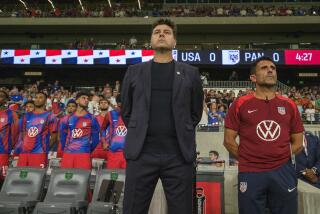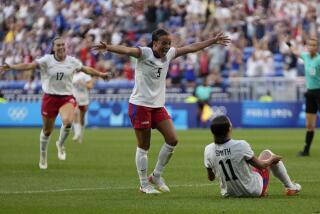Even in Defeat, U.S. Came Out a Big Winner
- Share via
Paul Caligiuri, whose decisive goal against Trinidad and Tobago in 1989 propelled the United States into the World Cup for the first time in 40 years, started every game for the U.S. in the 1990 and ’94 World Cups. He made 110 appearances for the U.S. during his international career. He played six seasons in the MLS, the last five with the Galaxy, before retiring after last season to coach the men’s and women’s soccer teams at Cal Poly Pomona.
*
It’s a shame that the best effort of the United States at the World Cup will be remembered as a loss. The Americans outplayed a three-time world champion, dominating possession and offense, but could not score a goal.
Coach Rudi Voeller says he’s not happy with the way the Germans are moving on to the semifinal, but he has to be very relieved. I’ve been reading the German newspapers online and our “cowboys”--as the German media had taken to calling the Americans--rode herd on his team for most of the game.
Coach Bruce Arena chose to bring Frankie Hejduk back into the lineup, sitting Josh Wolff, the only change from the Mexico game. Arena listed five defenders and only one forward, Brian McBride, in what could have been, or should have been, a 5-4-1 formation. The U.S. never really played that formation, with Arena sending Landon Donovan to play alongside McBride, as in previous games.
Hejduk ran from the midfield and the U.S. spent 58% of the time in the German end. Donovan had played well before, but Friday he played to his full potential and was unlucky not to score. Claudio Reyna also had his best match of the Cup. Unfortunately, so did German goalkeeper Oliver Kahn, who, with the help of Torsten Frings’ dangling arm, kept all six of the American shots on goal out of the net. Germany had only two shots on goal, both sizzling headers. One scored and one bounded off the post. The danger came where I thought it would, high balls served in from the wings.
The game got extremely physical. Emotions ran high for more reasons than this simply being a World Cup quarterfinal.
Respect is a word overused and misused in sports. But having played for six years in Germany, I had a pretty good idea what guys like Hejduk, who faced three of his Bayer Leverkeusen teammates, and Tony Sanneh, who plays for FC Nuremberg, were feeling. Add to that the experiences of Donovan, Reyna and McBride, who moved on after failing to win significant playing time in the German Bundesliga or second division, and there was substantial emotional subtext.
Germany has always been one of the hardest places for an American player to establish himself. Because of that, this game would carry great weight.
While the Germans may respect the improving technical skill, athleticism and work ethic of American players, they have never been open to accepting them as full-blooded members of the international soccer community.
That might have changed Friday. Sanneh’s last four matches are the best of his career; his defense was impenetrable against some of the world’s best and he demonstrated rare skill in keeping possession and moving the ball forward into the attack.
Certainly, his stock has risen at Nuremberg. Hejduk also performed well and will go back to Leverkeusen with his head held high.
The American success--and this tournament was an unqualified success--leads to hard questions about Major League Soccer stars such as Donovan, DaMarcus Beasley, Clint Mathis, Eddie Pope and Pablo Mastroeni. Any one of them may be coveted by the money leagues in Europe. At the same time, American soccer needs to continue building an identity and developing the next wave of players.
It will be a collective effort from U.S. Soccer, MLS and groups such as Anschutz Entertainment Group that are committed to see soccer succeed. Somehow, 2006 doesn’t seem all that far away.







